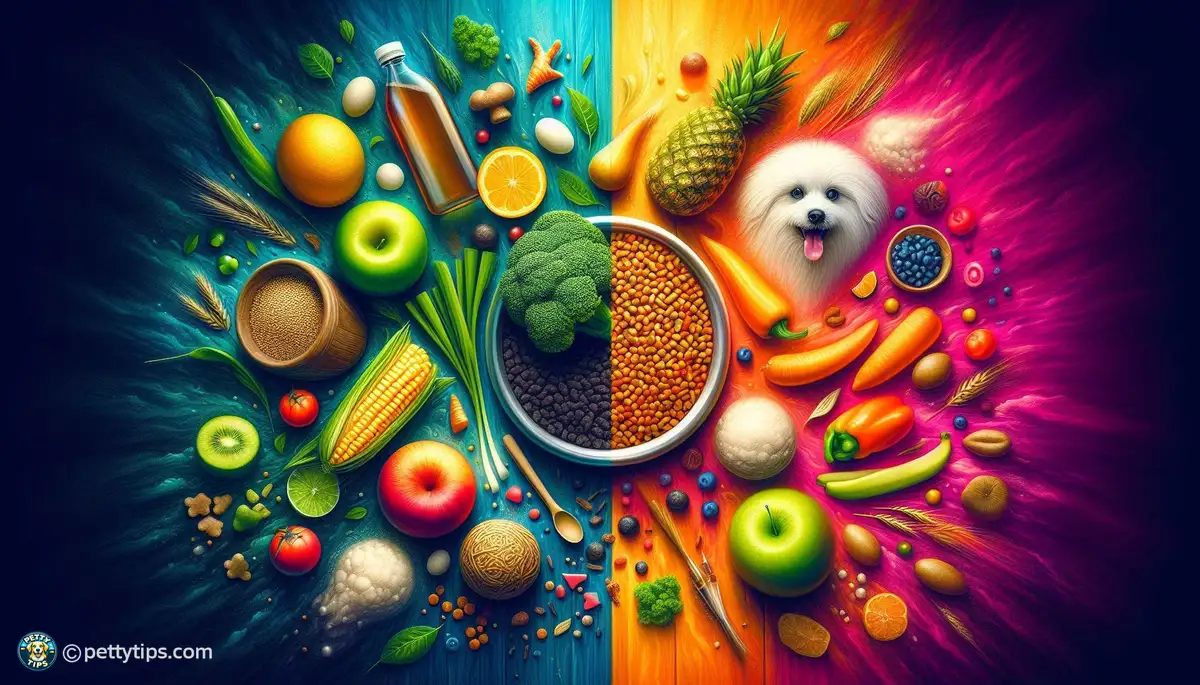
Intro to Vegetarian and Vegan Diets for Pets
Michael Enright - Oct 21, 2024 - 6 min read


When it comes to choosing the right food for your beloved pet, the term 'organic' often pops up. But what exactly does it mean? Organic pet food is made from ingredients that are grown without synthetic pesticides, herbicides, or fertilizers. These ingredients are also non-GMO and are not treated with artificial colors, flavors, or preservatives. Essentially, organic pet food is crafted with the highest standards of natural ingredients, providing a wholesome and nutritious option for your furry friend.
On the flip side, non-organic pet food doesn't necessarily mean it's inferior. These products may contain ingredients that are conventionally grown with the use of synthetic pesticides and fertilizers. However, they still undergo rigorous quality control measures to ensure they meet nutritional standards for pets. While they may not boast the organic label, many non-organic pet foods still provide essential nutrients for your pet's health and well-being.
When comparing organic and non-organic pet foods, it's essential to look beyond labels and examine the nutritional content. Organic pet foods often contain high-quality proteins, whole grains, and natural sources of vitamins and minerals. These ingredients are carefully selected to provide a balanced diet that promotes optimal health for your pet. On the other hand, non-organic pet foods may also offer similar nutritional benefits, albeit with different sourcing methods.
One significant difference between organic and non-organic pet foods lies in ingredient sourcing. Organic pet foods prioritize ingredients that are grown sustainably and without the use of synthetic chemicals. This ensures that your pet receives wholesome nutrition without harmful additives. In contrast, non-organic pet foods may contain ingredients sourced from conventional farming practices, which may involve the use of synthetic pesticides and fertilizers.
Many pet owners choose organic pet food for its potential health benefits. Organic ingredients are often higher in essential nutrients and free from artificial additives, making them easier for pets to digest. Additionally, organic farming practices promote soil health and biodiversity, which can have positive ripple effects on the environment and your pet's well-being.
While organic pet food may seem like the gold standard, non-organic options shouldn't be overlooked. These products undergo stringent quality control measures to ensure they meet nutritional standards for pets. Additionally, many non-organic pet foods offer a wide variety of flavors and formulations to suit your pet's preferences and dietary needs.
For environmentally conscious pet owners, the choice between organic and non-organic pet food extends beyond nutrition. Organic farming practices prioritize sustainability, promoting soil health, water conservation, and biodiversity. By choosing organic pet food, you're not only nourishing your pet but also supporting eco-friendly agricultural practices that benefit the planet.
While organic pet food may have a smaller environmental footprint, non-organic options also play a role in sustainable pet food production. Many non-organic pet food manufacturers are implementing eco-friendly initiatives, such as sourcing ingredients locally and reducing packaging waste. By supporting these efforts, you can make a positive impact on the environment while providing your pet with nutritious food.
One common concern among pet owners is the cost of organic pet food. Due to the higher quality ingredients and sustainable farming practices, organic pet food often comes with a higher price tag. However, many pet owners view this investment as a worthwhile expense to ensure their pet's health and well-being in the long run.
For pet owners on a budget, non-organic pet food may be a more cost-effective option. These products typically offer a range of price points to suit various budgets, without compromising on quality. By exploring different brands and formulations, you can find a non-organic pet food that meets your pet's nutritional needs without breaking the bank.
When it comes to choosing between organic and non-organic pet food, it's essential to consult with your veterinarian. They can provide valuable insights based on your pet's age, breed, and health status, helping you make an informed decision that prioritizes your pet's well-being.
Ultimately, the best choice of pet food depends on your pet's individual needs and preferences. Pay attention to how your pet responds to different foods, and make adjustments as needed to ensure they thrive. Whether you choose organic or non-organic pet food, prioritize quality ingredients and balanced nutrition to support your pet's health and happiness.
In conclusion, the choice between organic and non-organic pet food is a personal decision that should be based on careful consideration of your pet's nutritional needs, your budget, and your values as a pet owner. By understanding the differences between these options and weighing the pros and cons, you can make an informed choice that promotes the health and well-being of your furry companion.